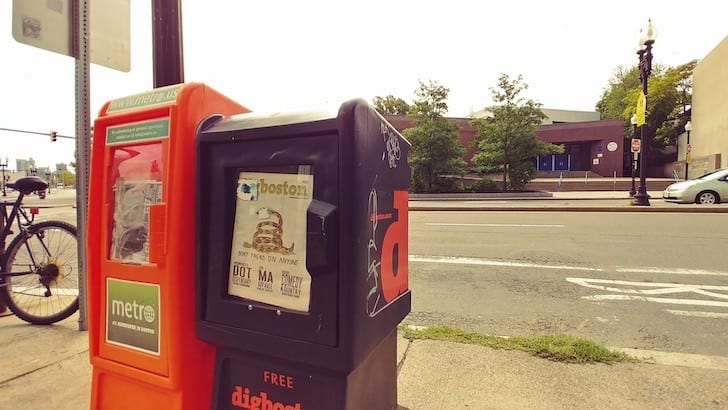
Dear Reader,
As I mentioned in passing in last week’s issue, as we were going to print for the first time in 2020—putting the paper to bed, as I like to say—we received word that Metro Boston (also known as the Boston Metro, or sometimes just the Metro) was closing up shop. It’s just the latest round of wrenching news on the local media front, but for us I suppose it hits especially close to home because it leaves the Dig as one of the last few free papers in Boston, a city that as recently as 15 years ago was overrun with street ink of various sorts. Even Barstool Sports had a physical rag back then.
Thankfully, there are still some solid neighborhood outlets like the Dorchester Reporter, plus topical standouts such as the Bay State Banner; but if you’re out and about in the Hub and trying to ascertain what music, food, beers, booze, and culture to consume, you’re pretty much stuck with either us, or with trying to navigate the world wide web and its innumerable marketing scoundrels who guarantee that you will find paid advertorials as opposed to curated content produced by knowledgeable writers.
The Metro may have had less guts in recent years than it did at its high points—the damn thing lasted nearly two decades, which is like a century in publication years—but through the end it was a home for many of the sort of learned journalists we need around here. Mornings on the train won’t be the same without the likes of Morgan Rousseau and Nate Homan, the latter of whom we also consider family here at the Dig. And let’s not forget about the many talented writers who passed through its doors over the years; the day after the announcement of its closing, I happened to be in Washington, DC, meeting with journalism funders, and one of the foundation grantmakers said they worked as an intern at the Metro back when they were in college. It’s not the craziest coincidence that ever happened, but it does raise a serious point—where the hell are young reporters going to get experience if there aren’t any outlets left?
It probably goes without saying that it’s a good thing for the Dig that the Metro closed down; indeed, you will be seeing many ads in these pages that were formerly in its. That’s a silver lining, but it doesn’t mean I’m happy about the loss. As proof, the nonprofit that I run with my partners from the Dig, the Boston Institute for Nonprofit Journalism, partnered on, produced, and paid for several articles in the Metro last year. Most of them were about the MBTA, and we embraced the collaboration because Greater Boston needs—hell, the region deserves—to have the best transit paper possible, preferably one that covers mass transportation.
As the lone remaining leaf on the street in some neighborhoods and corners, we promise to take the responsibility that comes with that seriously. We hope to keep expanding, and to provide more articles about the T and other topics as well. No matter what, though, we’ll never be the Metro, or the Improper Bostonian, or the Phoenix, or any of the others that have left us. They’re gone forever, and we are all worse off as a result.
CHRIS FARAONE, EDITOR-IN-CHIEF
A Queens, NY native who came to New England in 2004 to earn his MA in journalism at Boston University, Chris Faraone is the editor and co-publisher of DigBoston and a co-founder of the Boston Institute for Nonprofit Journalism. He has published several books including 99 Nights with the 99 Percent, and has written liner notes for hip-hop gods including Cypress Hill, Pete Rock, Nas, and various members of the Wu-Tang Clan.

